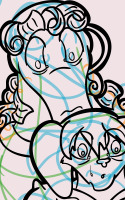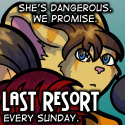In Defense of Giving your Work Away:
(a.k.a. "The edge Cartoonists have over the RIAA")
This post is a glorified response to an interview over at kottke with Cory Doctorow, who apparently has some fairly strong opinions about giving away your work. Naturally, there're a few hecklers in the comments who don't "get it". This would be a fine argument to sit on the fence of, except I know of at least one stable business model that basically thrives on 'Giving Work Away', and since I'm reposting my remarks (more or less), you can take a guess what I'm referring to: Comics, comics, and more comics.
For years, people only paid for their newspaper comics as an incidental part of the newspaper; to children and adults alike, such work was essentially 'free' for them, because newspapers were a given and the news content of the paper was what was truly 'paid for', and not the comics, except when they bought the books and merchandise. The system had hiccups, the way any general monopoly does, but for several decades this model worked out fairly well for cartoonists (at least the ones that "made it", anyway).
The internet equivalent is in webcomics, with several key differences; no editorial process, no risk of a risque strip being yanked, no pre-payment from newspapers to publish and carry the work. One would expect that, if comics worked the way books and music work, they would charge people just to see the pages.
Yet they don't. All their work is free to view, and in most cases, so are the archives, making it harder to justify book sales. And yet there are probably just as many (if not more) people profiting off of webcomics, even if these profits are not as big (yet) as the average person appearing in newspapers. These cartoonists are just as niche, just as specialized, have just as much to lose, and yet they thrive, even when the majority of their work is just 'given' away.
Why? Because cartoonists work constantly. There is always 'another day' to cover, another page in the story, another advancement of the tale, and thus each individual page is cheap and worthless without the rest of the story. That commitment to the work's creator (and NOT their work itself) is the most important vector for profit. Nobody 'cares' about DMFA; they like it, sure, maybe even love it, but they care about Amber far more. Schlock Mercenary is good, but Howard Tayler is better.
The comics are an elaborate lure designed to make you want more, and recognize the hand that feeds; the person behind the comics becomes center stage. And it's not just comics; the whole "2.0" revolution is based around this idea. Jonathan Coulton's songs and Hugh MacLeod's cartoons are proof that stable models can be built around people, and not just items. The work is worthless without the creator, and so giving away the work is exactly what they WANT to happen, because as long as people can follow the lure back to the hook, everyone gets what they want.
The way songs (and other media) are done now, though, there's no lure past the song itself; the song IS the hook, so to speak. So . . . perhaps the reason big, foreboding, faceless companies are afraid of giving away their work is because they know that there's no person behind the work, and so they're subconsciously afraid that once people have it, they won't want anything more from their 'creators'.
No wonder they're scared of file-sharing; it actually forces people to care about something other than material items for a change.
Labels: advertising, comics, content, reputation, web 2.0




